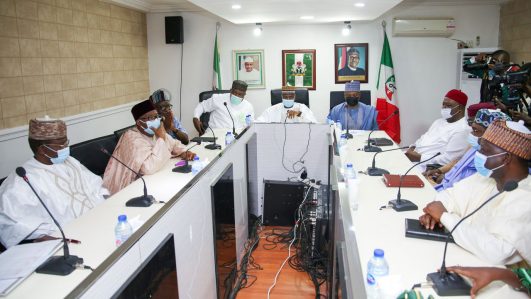
The spate of coordinated attacks in the South-East and South-South regions is symptomatic of a failed state that should worry the regional authorities even more than they have currently expressed. Unabated, the free reign of anarchy fueled by criminal elements under some political disguise will in no time destabilise the region as it is happening in the north, and push the country further on the brink. Governors, even though manifestly handicapped because they have no direct charge of security agencies, can nevertheless do more by regarding the perpetrators of violence as enemies of the state.
Regional state-actors have a duty to shelve political divides, summon collective resistance and deliver their people from sponsored terrorism, given, as it were, that the federal government has failed to secure the citizens. How else can one lament the situation in those two regions where law enforcement agents, including soldiers, are waylaid and freely executed for months without anyone being arrested or prosecuted? All that follows each orgy of death is wailing and condemnation by the authorities. The governors actually indicated, at their last meeting in Abuja under the Nigerian Governors Forum (NGF) that but for their intervention, criminality in their domain could have been worse. Even if that is so, Nigerians in those affected regions will settle for no less than peace and freedom to live their lives normally. They have effectively been deprived of these simple attributes for too long and with no respite in view.
Typical of the Boko Haram insurgency in the Northern states, the reign of terror and anarchy are gaining territories especially in Eastern parts of the country. The malaise assumed a more horrifying dimension that beclouds the presence of state authority and governance in the region, as a gang of rampaging criminals ran over the Police Headquarters in Imo State and Correctional Service Centre in Owerri. About 2000 inmates were set free and largely on the run. Not done, the assailants went to Ehime Mbano Local Government Area Divisional Police Headquarters just hours after the Vice President, Prof. Yemi Osibanjo, and the former Inspector General of Police visited the state on an assessment tour. The invaders detonated bombs, fired shots and raided formations for hours without any resistance. About 50 vehicles and several buildings were razed. On their way too, military checkpoints were attacked and at least two soldiers killed.
Indeed, no fewer than five security formations had been raided in the last three months. The gory tale and apprehension are all over the region, including Anambra, Ebonyi, Akwa Ibom, Rivers and Delta states. In Ebonyi, specifically Obeagu, Egedegede, Amaizu and Effium communities in Ishielu and Ohaukwu Local Governments Areas, gunmen suspected to be Fulani killed 22 persons lately. In Anambra, at least six policemen, four officers of the Nigerian Navy and several civilians were killed in the last couple of weeks. The catalogue of reprehensible attacks is heart-wrenching. Yet, the security agencies have no satisfactory response.
Hapless Nigeria Police have blamed the Indigenous People of Biafra (IPOB) and the Eastern Security Network (ESN) for the assaults; both of whom had told the Police to look elsewhere, specifically at armed Fulani herdsmen allegedly bent on Fulanisation agenda from the north to the south, this time, through the Eastern flank. It leaves the Police with burden of proof and more intelligence in unraveling the real criminals, including those possibly giving the Fulani nation a bad name.
Within these uncertainties is an ongoing armed resistance and destabilisation cause, and the governors are yet to wake up to their real responsibility of safeguarding lives and property of their citizens. Some days ago, former Head of State, General Abdul-Salami Abubakar (rtd) warned that over six million weapons are in the possession of civilians. Unofficial estimates said small arms and light weapons may have reached over 30 million nationwide, and are cracking down against Nigeria.
Governors should be more afraid of their own laxity, if not failure. The primary responsibility of any government is security of lives, property and general well-being, which the Buhari-administration has shown to lack the capacity or courage to dare. Are the state governors also complicit, especially the ploy to run over the country by destablising regions? Otherwise, why has the East become the epi-centre of terrorism without any form of resistance from the security agencies and concerned authorities? Has the Nigerian Police collapsed completely? What happened to pieces of evidence, including the Closed-Circuit Television (CCTV) that was supposed to capture invaders in the Owerri attack? Is someone suppressing video and photo evidence revealing the true identity of the suspects? Are these governors so blinded by political affiliations and ambitions that they have lost the sense of propriety and duty to defend their own people? Who are those sabotaging the collective interest of Nigerians in the East? Absence of response to these questions is frustrating and typifies a failed state. But a non-complicit and serious regional governance structure should ask and get a good answer without care of whose ox is gored.
Events in the last few days are not just local grievances, but a crackdown metaphor. So, mollycoddling daylight terrorism and regional siege is not wisdom but folly that will engulf all in an imminent conflagration. The urgent remedy is to face up, pushback on aggressors and their sponsors on all fronts; building a credible firewall around the region. At perilous times like this, governors have an opportunity to show guts and demonstrate their understanding of what real governance and statesmanship are about. So far, only very few, out of 36, are speaking truth to power. The others are simply part of the stage. It is time for governors, particularly Eastern governors, to stand up and be counted.
END

Be the first to comment